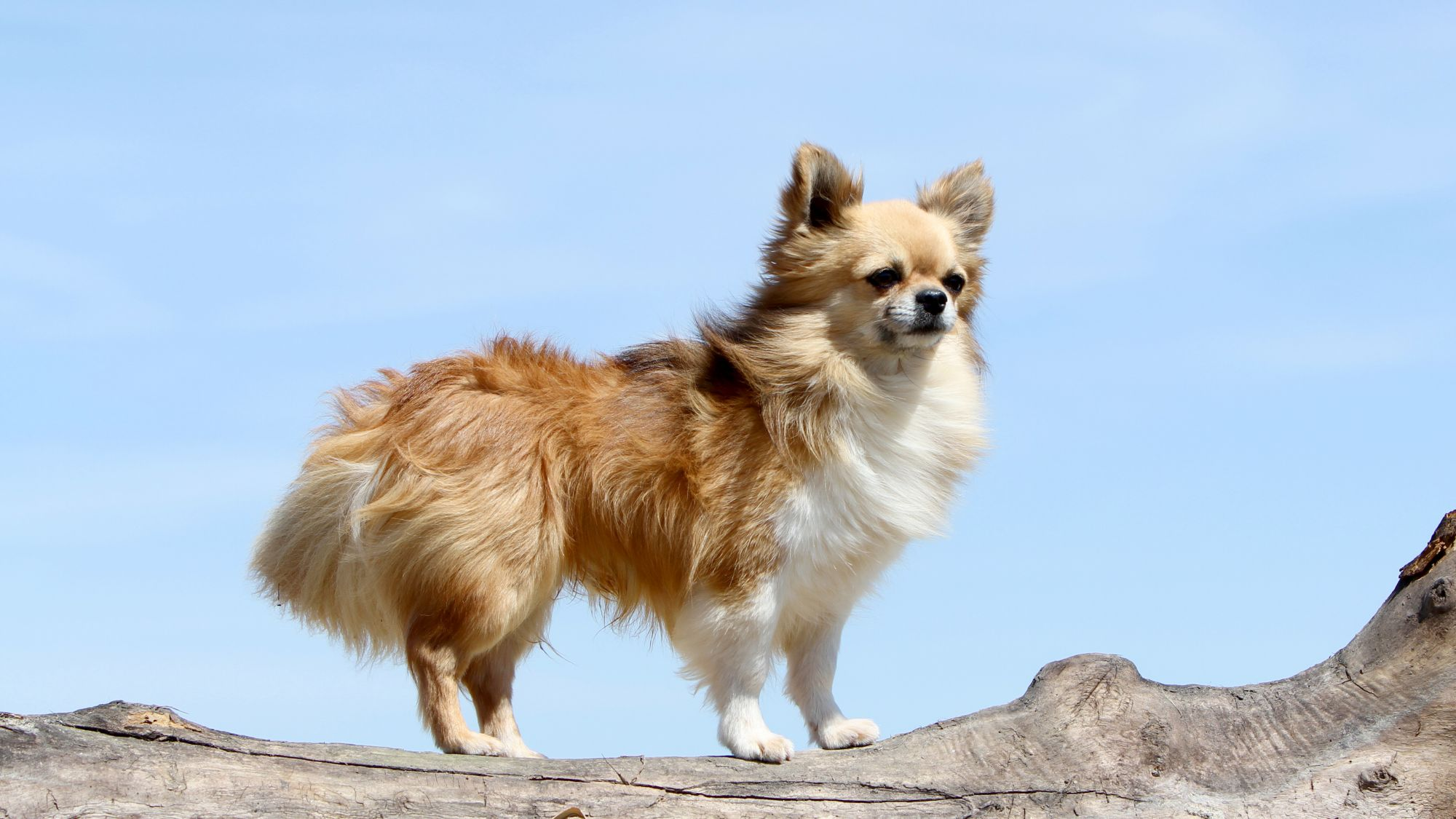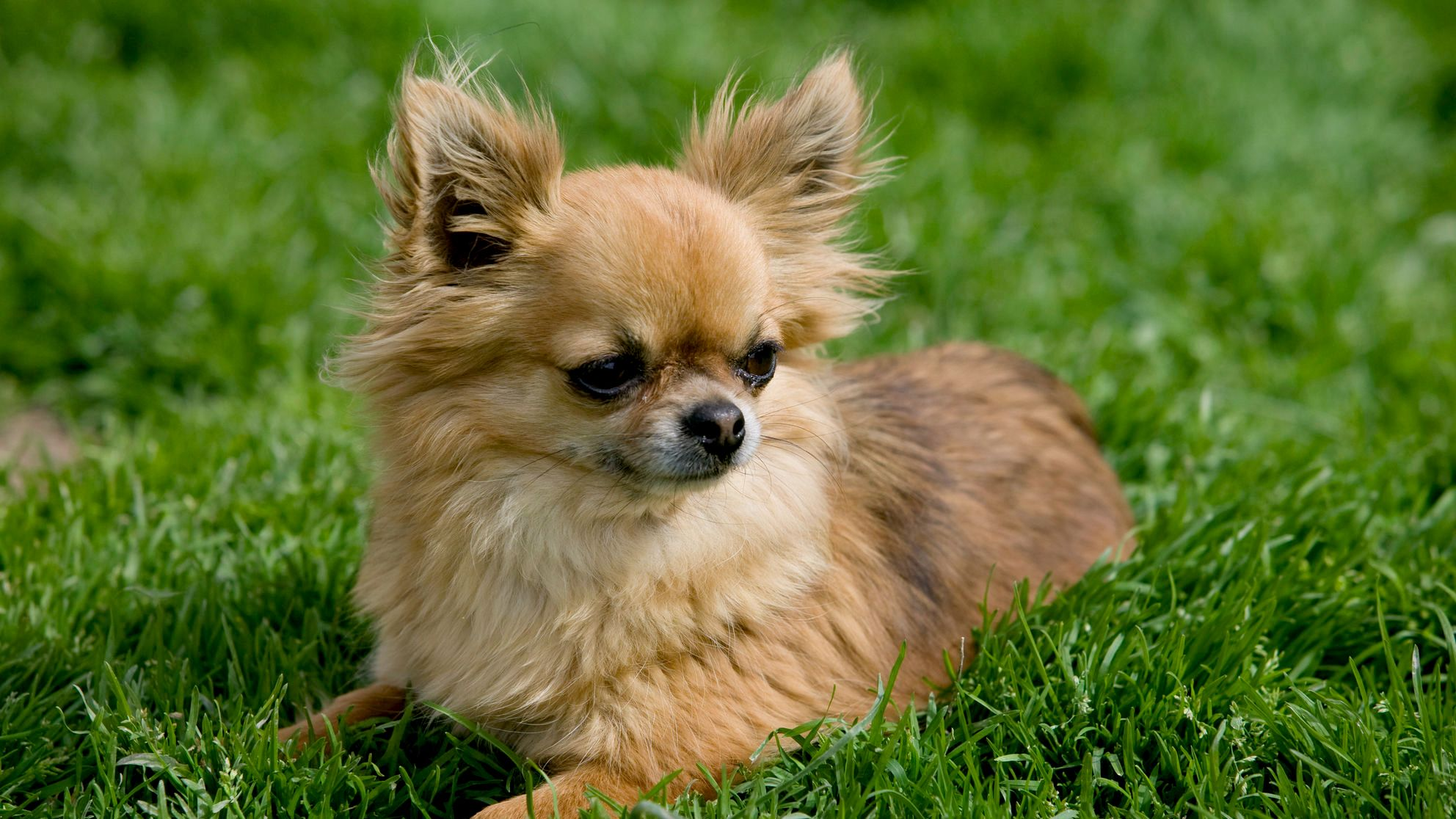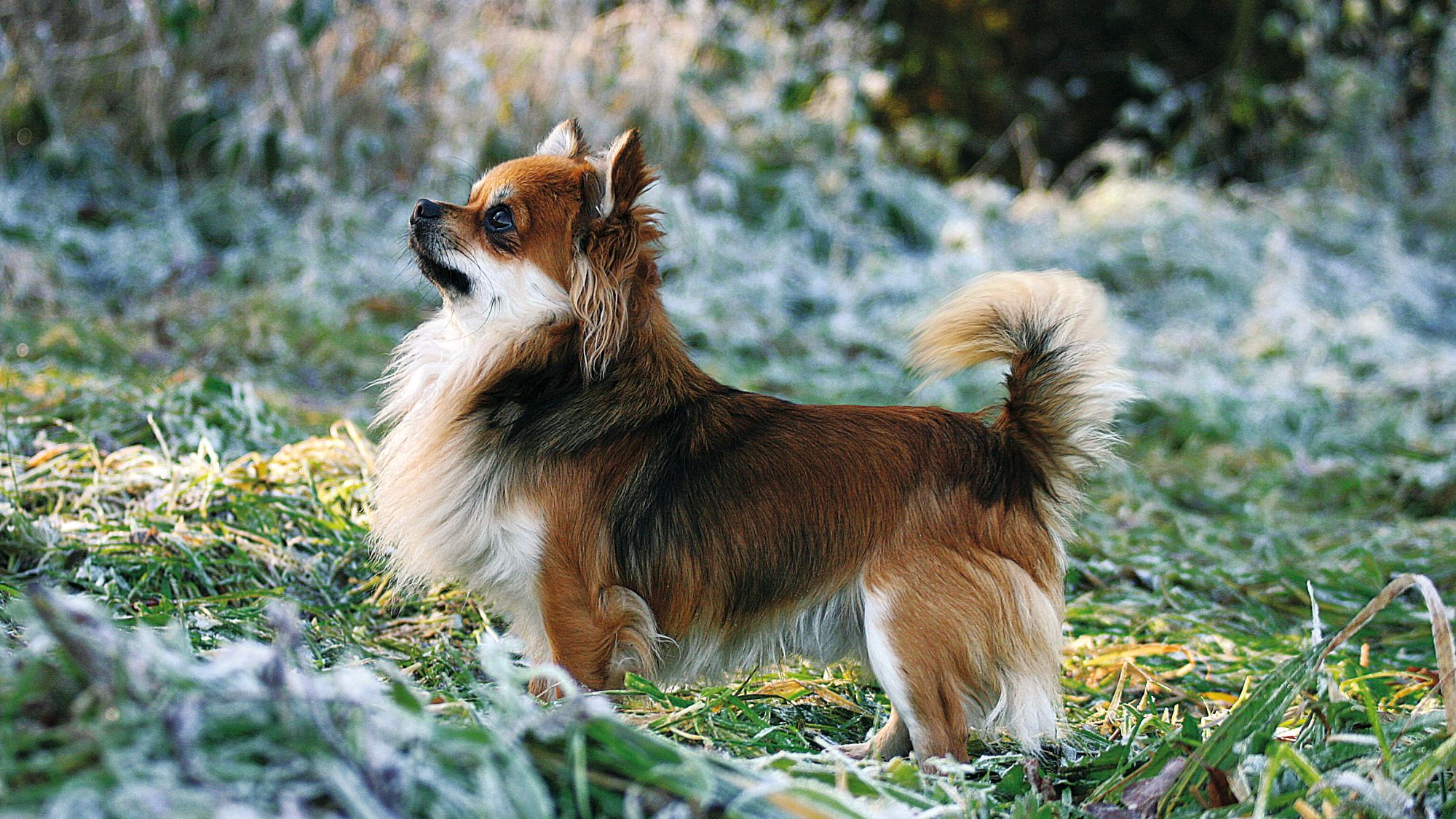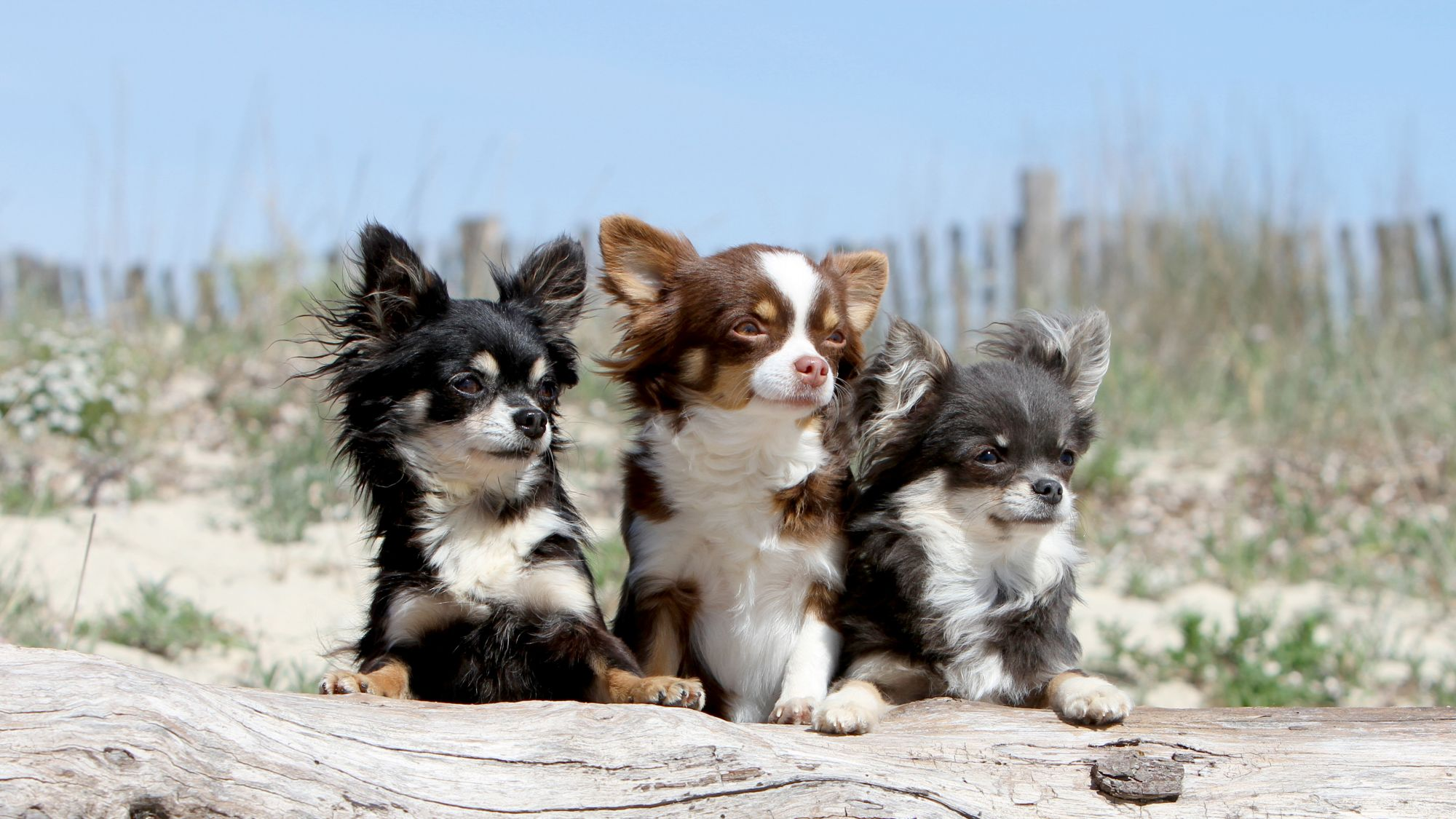Let's talk Long-Coat Chihuahuas
Petite yet mighty, Long-Coat Chihuahuas are the tiniest of breeds yet possess a big heart. Instantly identifiable by their apple-shaped head and doe-eyes, their devoted stare conveys the mammoth warmth found within. Chihuahuas are fiercely loyal, great for city or country homes, and with proper care, live very long healthy lives – often two decades or more. The breed also comes in a smooth-coat version.
Official name: Long-Coat Chihuahua
Other names: Chiwawa, Chi
Origins: Mexico
Drooling tendencies
1 out of 5Grooming needs
3 out of 5Shedding Level
3 out of 5Barking tendencies
2 out of 5Energy level
3 out of 5Compatibility with other pets
3 out of 5Warm weather?
3 out of 5Cold weather?
2 out of 5Suited to apartment living
5 out of 5Can stay alone
2 out of 5Family pet
4 out of 5
| Male | Female |
|---|---|
| Height | Height |
| 12.7 - 22.86 cm | 13 - 20 cm |
| Weight | Weight |
| 1 - 3 kg | 1 - 3 kg |
| Life Stage | |
|---|---|
| Puppy | Adult |
| 2 to 10 months | 10 months to 8 years |
| Mature | Senior |
| 8 to 12 years | From 12 years |
| Baby | |
| Birth to 2 months | |
Drooling tendencies
1 out of 5Grooming needs
3 out of 5Shedding Level
3 out of 5Barking tendencies
2 out of 5Energy level
3 out of 5Compatibility with other pets
3 out of 5Warm weather?
3 out of 5Cold weather?
2 out of 5Suited to apartment living
5 out of 5Can stay alone
2 out of 5Family pet
4 out of 5
| Male | Female |
|---|---|
| Height | Height |
| 12.7 - 22.86 cm | 13 - 20 cm |
| Weight | Weight |
| 1 - 3 kg | 1 - 3 kg |
| Life Stage | |
|---|---|
| Puppy | Adult |
| 2 to 10 months | 10 months to 8 years |
| Mature | Senior |
| 8 to 12 years | From 12 years |
| Baby | |
| Birth to 2 months | |

Get to know Long-Coat Chihuahua
All you need to know about the breed
“Best buddy” is the ideal phrase to describe the Long-Coat Chihuahua, the ideal companion dog. Loyalty is a given for a breed that easily cosies up but is always on alert where their owner is concerned. Barking at strangers may happen with the Chihuahua but it’s hardly cause for concern. They’ll soon be diverted by another nonstop activity. Playtime is anytime as far as they’re concerned!
The power-packed personality of the Chihuahua breed is evident in their official ranking: They currently hold 11th place on the American Kennel Club’s annual list of most popular breeds.
And can you say purse dog?! The breed never grows past 3 kilograms – 6 pounds – so taking them pretty much anywhere is doable.
When it comes to dogs, we’re often advised to watch children for fear that the dog may hurt them unwittingly. But because this breed is so small, children are the ones who could actually harm the Chihuahua without meaning to. They can be fragile so keep a watchful eye. Indoor play is ideal as are small dog parks. Mental stimulation is great for the Chihuahua breed, and games are an ideal pastime, too.
Far from being a hulking security dog, Chihuahuas can be just as protective of their flock. They tend to be reserved with strangers, but this wariness falls away once a new relationship is formed.

Two facts about Long-Coat Chihuahuas
1. Don’t spoil them too rotten
Believe it or not, Long-Coat Chihuahuas can gain weight easily. With a wee body, one too many snacks can quickly add up. Use a handful of kibble as a treat, taken from their daily meal allotment. The official breed classification puts the Chihuahua at six pounds (2.72 kg), tops.
2. So small in a big world
The Chihuahua personality is a bold one for sure: Not to be dismissed, they’ve been known to challenge dogs multiple times their size. Teaching your new dog a new trick – how to get along with others – will be key to proper socializing as they grow.
History of the breed
Many wonder where the diminutive Chihuahua comes from. The dog hails from 12th-century Mexico during the time the Aztecs conquered the Toltec civilization, and the Techichi dog, a denser ancestor of the Chihuahua breed. The Techichi was lighter and more agile than the current Chihuahua size, if that’s even possible for such a petite breed of dog.
Throughout the centuries, the Chihuahua persevered, eventually gaining huge popularity in the US in the mid-1800s when Americans discovered them in their area of origin, Chihuahua, the Mexican state that borders Texas. The Techichi was then renamed and the Chihuahua breed flourished north of the border.
Long-Coat Chihuahuas can be clannish, tending to stick with their own kind. Not bred for a particular job, Chihuahuas function best as a family dog and of course make a superb travelling partner. For that, they’re just the right size: The Chihuahua dog breed is considered the smallest in the world, maxing out at just over 6 pounds, or 2.72 kilos.
From head to tail
Physical characteristics of Long-Coat Chihuahuas
1.Ears
2.Head
3.Body
4.Fur
5.Tail

Things to look out for
From specific breed traits to a general health overview, here are some interesting facts about your Long-Coat Chihuahua
This is one dogged dog
The headstrong Long-Coat Chihuahua temperament and wilful determination is surprising, given their compact size. But small can still mean mighty when it comes to getting their way. The Long-Coat Chihuahua is smart and will outsmart you if you let him! The solution: Discipline your dog early and make sure they know who is in charge. Training your Long-Coat Chihuahua well can offset any tenacious streak they may have and instil good behaviour.
Too much exercise wears them out
The Chihuahua breed is a high-energy one for sure, but don’t mistake this characteristic for your Long-Coat Chihuahua’s desire to take super long walks or play endlessly. A small body means that less is more. Simple indoor activity is best on a daily basis for the Long-Coat Chihuahua dog, and they’ll get more mileage out of shorter strolls in the end. And as with all smaller dogs, if they get too tired, you can just pick them up and put them in a carrier the rest of the way home!
Chihuahuas can have a few health issues
Small dog breeds can be prone to hypoglycemia, or low blood sugar. It’s easy to think that the Long-Coat Chihuahuas’ little bodies don’t need a lot to go on but too-long a stretch between meals and your dog may have a serious dip in energy. Stick to a regular meal schedule and feeding guidelines on food packaging. The breed can also occasionally have cardiac concerns such as narrow heart valves or atrioventricular valve disease, or potential heart valve problems, eye disease and patellar luxation, or loose kneecaps. Regular veterinarian checkups can stem any problems before they start.

Caring for your Long-Coat Chihuahua
Grooming, training, and exercise tips
As a small dog, hikes and morning runs are ruled out, but there is plenty of activity the Long-Coat Chihuahua can get up to every day. Like any dog, they need moderate exercise to keep in good health. Short jaunts around a few blocks will work to keep them in good shape. The life expectancy of the Chihuahua is a long one; keep them fit all those years with appropriate activity, like simple play indoors and fun games of fetch.
The flowing tresses of the Long-Coat Chihuahua is a sight to behold. Keep their coat in shape by grooming it two to three times per week; doing so will help to avoid any tangles or mats, and don’t neglect the fringed hair on their ears, legs and feet as well. Shedding is luckily not an issue for the breed. Routine nail trims should be maintained as should the regular brushing of teeth to stave off any periodontal problems.
The devoted, smart Long-Coat Chihuahua is a delightful dog to have around. An intense loyalty means they’re motivated to please, and will definitely respond well to obedience training. Instilling good habits in your Long-Coat Chihuahua from a young age will yield the best results and curb the tendency to be overly assertive.
As a small dog, hikes and morning runs are ruled out, but there is plenty of activity the Long-Coat Chihuahua can get up to every day. Like any dog, they need moderate exercise to keep in good health. Short jaunts around a few blocks will work to keep them in good shape. The life expectancy of the Chihuahua is a long one; keep them fit all those years with appropriate activity, like simple play indoors and fun games of fetch.
The flowing tresses of the Long-Coat Chihuahua is a sight to behold. Keep their coat in shape by grooming it two to three times per week; doing so will help to avoid any tangles or mats, and don’t neglect the fringed hair on their ears, legs and feet as well. Shedding is luckily not an issue for the breed. Routine nail trims should be maintained as should the regular brushing of teeth to stave off any periodontal problems.
The devoted, smart Long-Coat Chihuahua is a delightful dog to have around. An intense loyalty means they’re motivated to please, and will definitely respond well to obedience training. Instilling good habits in your Long-Coat Chihuahua from a young age will yield the best results and curb the tendency to be overly assertive.
7/7
All about Long-Coat Chihuahuas
The Long-Coat Chihuahua has all the makings of a great pet: a fun temperament, high energy and affection in large doses. The Chihuahua breed is also great for those new to dog ownership. Let’s face it, there’s not a lot of dog there to handle! Loyalty is a given for the Long-Coat Chihuahua and their size makes for great portability as well.
Long-Coat Chihuahuas are not naturally aggressive; if they bark or snap it’s just that – like any dog – their bark at times may be worse than their bite. They could be territorial or anxious, and the breed can also be possessive of their owner. Even though they’re petite, the behaviour shouldn’t be classified as cute; it requires discipline, and doing so will actually help your Long-Coat Chihuahua feel comfortable. Rule out any underlying medical conditions as well that may be spurring on their anxiety.
Read more on this topic
Sources
- Veterinary Centres of America https://vcahospitals.com/
- Royal Canin Dog Encyclopaedia. Ed 2010 and 2020
- Banfield Pet Hospital https://www.banfield.com/
- Royal Canin BHN Product Book
- American Kennel Club https://www.akc.org/
Like & share this page